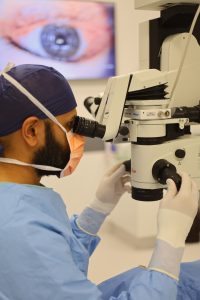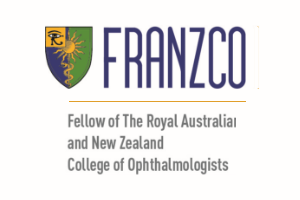Cataract Surgery
Catract Surgery

A cataract is a clouding of the natural focusing lens inside the eye. It is derived from the Greek word for waterfall.
Cataract surgery is the most common type of eye operation performed around the world. With modern techniques, the recovery is far more rapid than it used to be, and long-term results are excellent in the majority of cases.
If you experience symptoms of cataract, then surgery may help to improve the quality of your vision. You should ensure that you have had a thorough eye examination with an experienced cataract surgeon.
Cataract surgery is usually performed under local anaesthetic. Precision microsurgery is performed to carefully remove the cataract and insert a customised artificial lens. The lens is selected to give clear vision at distance, near, or both. There are several makes and models of artificial intraocular lenses (IOL). Not all lenses work for all patients.
Post-operative care involves eye drops for 3-4 weeks.
FAQ
No.
After cataract surgery, your vision may be improved immediately but not stable. Additionally, you may have received twilight anesthesia (sedation) prior to surgery, that may not have worn off completely. This makes it dangerous to operate a vehicle on your own.
After your cataract surgery, you should have someone take you home. It’s important that you have someone with you even if you’re taking public transportation or a taxi, just to ensure you get home safely and are able to rest.
Most patients are able to resume driving 24 hours or 48 hours after cataract surgery. However, this completely depends on the individual patient. The day after your surgery, you may return to your ophthalmologist clinic for a follow-up appointment. They will evaluate your vision and determine when it’s safe for you to drive and resume other normal activities.
It is very important that you wait for clearance from your doctor, as some patients heal more quickly than others. It could be that your doctor recommends waiting a little while longer before driving again, just to be safe. For this reason, you should also plan on having someone drive you to and from your follow-up appointment. Keep in mind that you may be required to wear an eye shield for a few days after surgery to aid your healing. It may also take about a week for your vision to completely stabilise. Your eye surgeon will discuss these factors, and how they may affect your ability to drive, during your post operative consultation.
Cataract surgery recovery can sometimes feel overwhelming however, it does not necessarily stop you from doing most of your daily activities and tasks.
In fact, doing light housework is totally okay, however, you should refrain from heavy lifting and bending over for up to a week after surgery. You should put aside any intense physical activities until your eye has fully recovered.
After surgery, your eyes will need time to heal. They might be more sensitive than normal. We advise all of our patients to avoid heat, steam and moisture for the first few days after cataract surgery.
Most patients can return to normal activities in terms of watching television, using a computer and mobile phone in the first day or two following cataract surgery.
After cataract surgery, you may be concerned about how you will sleep.
Wearing an eye shield is very important while sleeping. This will reduce the chances of infection and you rubbing your eye inadvertently.
You should try not to sleep on the side with the recovering eye in addition to wearing your eye shield. You can sleep on the opposite side of the eye that was operated to decrease risk of infection and irritation.
Each patient is different, so it is important to find a position that is comfortable for you.
- Your vision will seem blurry, and pupil will remain dilated for many hours after cataract surgery.
- After the cataract has been removed, a lot more light can now enter the eye. Sunlight and artificial lights may seem brighter.
- You may see haloes or circles around bright lights if you had a multi focal lens implanted into your eye. This sensation settles down for most patients over days to weeks, but may not disappear completely.
- You may feel a foreign body sensation or irritation in the eye, which usually settles down over a few days.
- Your eye may look pink or even quite bruised after a cataract surgery, and this is more likely if you are taking blood thinners such as warfarin. This is very common.
One thing that can help with your recovery is the eye drops that are provided along with instructions on how to use them.
If you experience any of the following symptoms post cataract surgery you should consult eye doctor on emergency basis
- Increasing pain
- Deterioration or loss of vision
- Increasing redness
You can take showers or bath after 24 hours of your cataract surgery.
Be careful not to get water or soap in your eye in the first week.
Clear any debris or mucus from your eyes with a wet cloth soaked in cooled boiled water.
Make sure you use a gentle eye cleanser and avoid using harsh soap.
Wait at least two days after surgery before you begin washing your hair with mild or baby shampoo or soap.
Try not to get water or soap in your eye.
After cataract surgery, you may feel tired and want to do more rest for the remaining day. This is very common.
Plenty of rest after your cataract surgery will speed up your recovery time.
Many people report that they feel sand in their eyes following eye cataract surgery, and it is a normal sensation. Most patients do not have a suture (stitch) in their eye, however the process of the surgery and antiseptic used to clean the eye can make the surface of eye dry and irritated. These symptoms settle down very quickly for most patients.
Generally, stairs are safe after cataract surgery. However, it can be different for each person. Make sure to talk to your eye doctor if you have any concerns.
After 1 week, you can usually stop wearing an eye shield or not while sleeping. Make sure to consult an eye doctor before doing anything.
You can now comfortably watch TV, computer / laptop, mobile and can read newspapers without any strain in your eyes.
Your vision may not be perfect yet, but should be improving over time.
After a month mark your vision should be much clearer than before cataract surgery. The eye should have almost healed completely.
Colours may look brighter and objects will look sharper.
You should avoid swimming for at least 4 weeks after cataract surgery.
Blogs related to cataract surgery
Cataract Surgery for Patients with Diabetes: What You Need to Know
Are you a patient with diabetes who needs cataract surgery? Read on to learn about the risks, benefits, and considerations for this procedure. Cataracts are …
How to Manage Dry Eyes after Cataract Surgery: Tips, Tricks, and Home Remedies
Struggling with dry eyes after cataract surgery? Here are some practical tips, home remedies, and expert advice on how to manage dry eyes and improve …
From Blurry to Clear: A Look at How Cataract Surgery Can Change Your Life
At a glance: CataractsEarly Symptoms: NoneLater Symptoms: Blurry vision, colours that seem faded, sensitivity to light, trouble seeing at night, double visionDiagnosis: Dilated eye examTreatment: …
Causes of Cataract
Cataracts are a serious condition that can cause loss of vision. What are themost common causes of cataract? Find out for yourself in this article! …
Symptoms of cataract
Vision with Cataract What are the Symptoms of Cataracts? A cataract is a problem with the clarity of the natural lens, that can cause vision …
Cataract Surgery Aftercare
If you’ve just had cataract surgery, you might wonder what to expect after the procedureis over. Will you be able to see clearly? Is there …
Cataract Surgery in Infants And Children
A cataract is a medical condition where the natural crystalline lens of the eye becomes cloudy or opaque. Cataracts are usually occur more commonly with …
Traditional Cataract Surgery Vs Laser-Assisted Cataract Surgery
Cataract is one of the most common eye diseases, caused due to cloudiness of the natural lens inside the eye. It is generally seen in …
What happens if cataract is left untreated?
If cataract is neglected for long enough, cataract surgery can be more complicated, and the eye can take much longer to recover. The longer a …
10 facts about Cataract
Dr Parth Shah performs cataract surgery in Canberra for patients of all ages – from newborns to the elderly. The term ‘cataract’ is well known …







